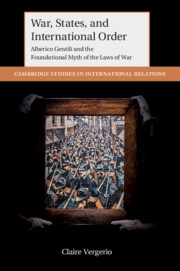Refine search
Actions for selected content:
3 results
3 - Grounding an Absolutist Approach to the Laws of War
- from Part I - Gentili’s De iure belli in Its Original Context
-
- Book:
- War, States, and International Order
- Published online:
- 21 July 2022
- Print publication:
- 04 August 2022, pp 91-132
-
- Chapter
- Export citation

War, States, and International Order
- Alberico Gentili and the Foundational Myth of the Laws of War
-
- Published online:
- 21 July 2022
- Print publication:
- 04 August 2022
5 - The Sovereign
-
- Book:
- The Sovereignty Cartel
- Published online:
- 23 July 2021
- Print publication:
- 12 August 2021, pp 79-101
-
- Chapter
- Export citation
